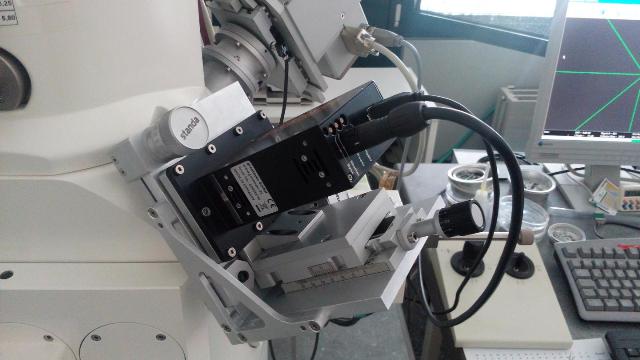 This is a photo of the new WDS instrument that is connected to a scanning electron microscope (Zeiss EVO 40) by means of a standard housing and mounting flange. Credit: HZB
This is a photo of the new WDS instrument that is connected to a scanning electron microscope (Zeiss EVO 40) by means of a standard housing and mounting flange. Credit: HZB
Researchers at the Helmholtz-Zentrum Berlin für Materialien und Energie (HZB) have developed a specialised wavelength dispersive spectrometer which can help to accurately detect light elements when using an electron microscope.
Scanning electron microscopes are used to analyse the surface topology and chemical composition of samples.
During scanning, the atoms of the sample fluoresce due to the electron beam’s irradiation, which allows the element type to be identified, with its location provided by secondary emission. However, they cannot effectively detect lighter elements.
Previously, the head of the Institute for Nanometre Optics and Technology at HZB, Prof. Alexei Erko, had developed and patented innovative optics known as reflection zone plates, which comprise of thousands of elliptical or concentric lenses. A conventional glass lens refracts radiation, but the reflection zone plates diffract radiation so as to induce interference. Reflection zone plates are used to analyse soft X-ray radiation in BESSY II and other such synchrotron sources.
High resolution in this energy range is important for detecting lighter elements of the periodic table. That is particularly important for research on energy-related materials like solar cells, batteries, and solar fuels, as well as catalysts. But it could also be useful in research on magnetic materials and in life sciences. We are very excited about what this new tool can be used for.
Prof. Alexei Erko, Head of Institute for Nanometre Optics & Technology at HZB
The researchers used a 17 reflection zone plate array that had the capacity to cover an energy range between 50 and 1120eV. The optics created using 200 reflection zone plates covered a higher energy in the range between 100 to 1000eV, which provided a better resolution.